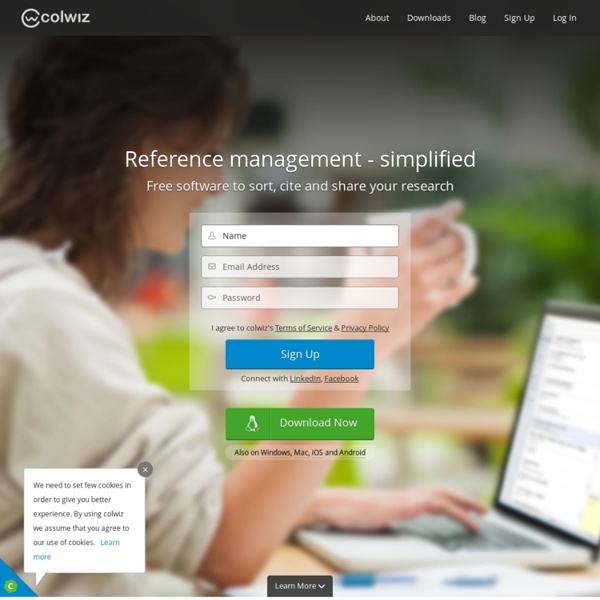



Docear Bring Your Articles to Life with ReadCube's Enhanced PDF "The enhanced PDF made the "normal" PDF's jealous. The reference integration should be available in every PDF reader, it's that good!" Dan Turmand Emmanuel College "It's great. Michael Ross Northwestern University "I love that everything is inline! Jordan Reuter Microbiology and Cell Science student, University of Florida "ReadCube is where software should be heading. Jen Humphrey MacQuarie University "ReadCube not only provides a single all-in-one platform to carefully read an article, but also does it in a very attractive and friendly way. Israel Pichardo-Casas Instituto de Fisiología Celular, National University of Mexico
Open Biotechnology - Making biotech open source and tearing down barriers to science Qualrus - The Intelligent Qualitative Analysis Program EndNote - EndNote X3 doesn't have the Emory U connection file to connect directly to EUCLID. How can I get it? If you have a pre-X5 version of EndNote, get the NEWLY UPDATED (Feb 2011) EmoryU connection file here. Should I use one library for all my references, or separate libraries for different projects? It's entirely up to you; there's no right or wrong way to organize your files. I already have a long bibliography that I typed in Word. Unfortunately there's no way to do this automatically. How do I download search results from my favorite database into EndNote? Every database works a little differently. I tried using a connection file to search a database, but it asks for a password. EndNote includes connection files for databases to which Emory doesn't subscribe, so you may not be able to connect. How do I add page numbers to an in-text citation? Right-click the formatted citation and choose "Edit Citation" from the menu.
KLEENK ResearchWare: Simply Powerful Tools for Qualitative Analysis Docear ScienceLab- Mozilla The vision The web has revolutionized many aspects of our everyday life, from media to education and business. But even though the web was invented by scientists, we still have not yet seen it change scientific practice to nearly the same extent. In scientific research, we’re dealing with special circumstances, trying to innovate upon hundreds of years of entrenched norms and practices, broken incentive structures and gaps in training that are dramatically slowing down the system, keeping us from making the steps forward needed to better society. The aim of the Science Lab is to foster an ongoing dialogue between the open web community and researchers to tackle this challenge. Focus areas Code and data literacy Digital literacy is as important as reading, writing and arithmetic. Software Carpentry Software Carpentry helps researchers be more productive by teaching them basic computing skills. Support and innovate with the community Convening a global conversation The team How to get involved